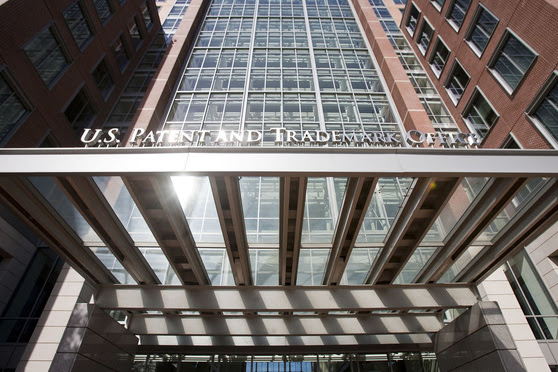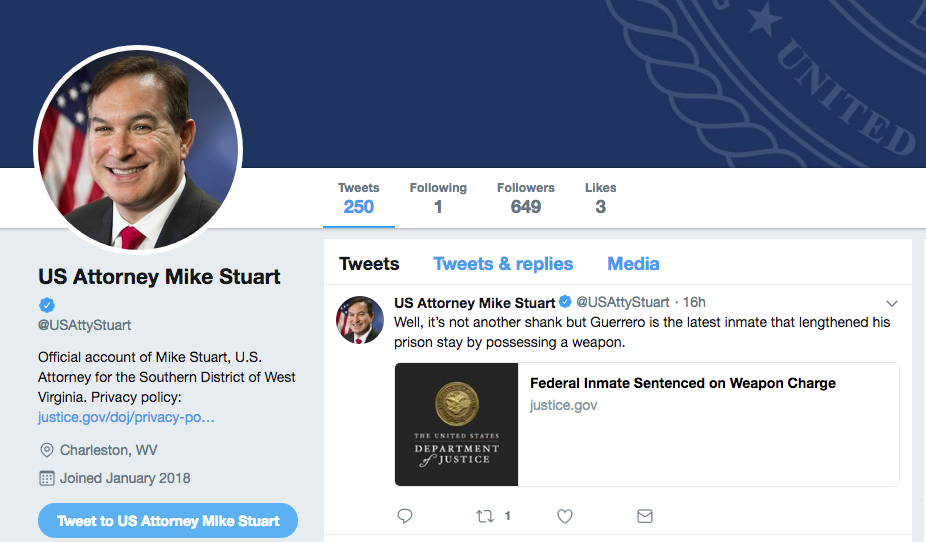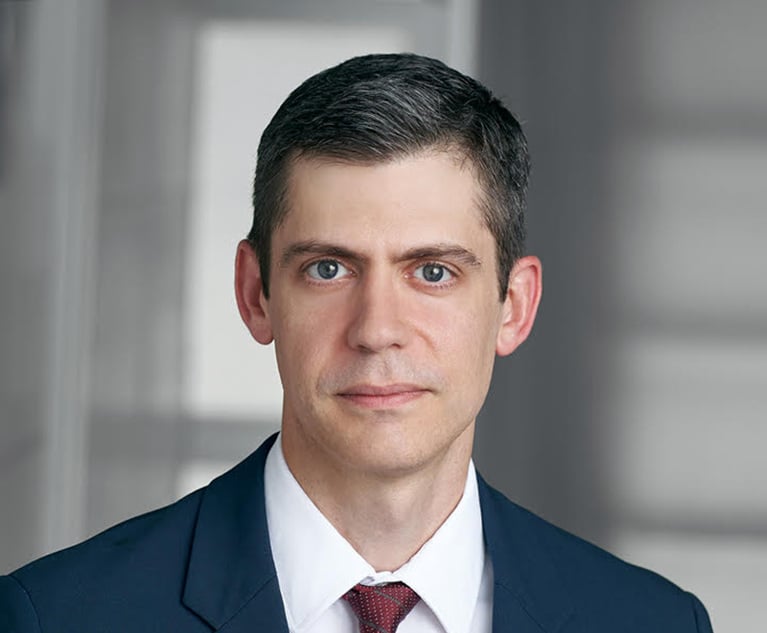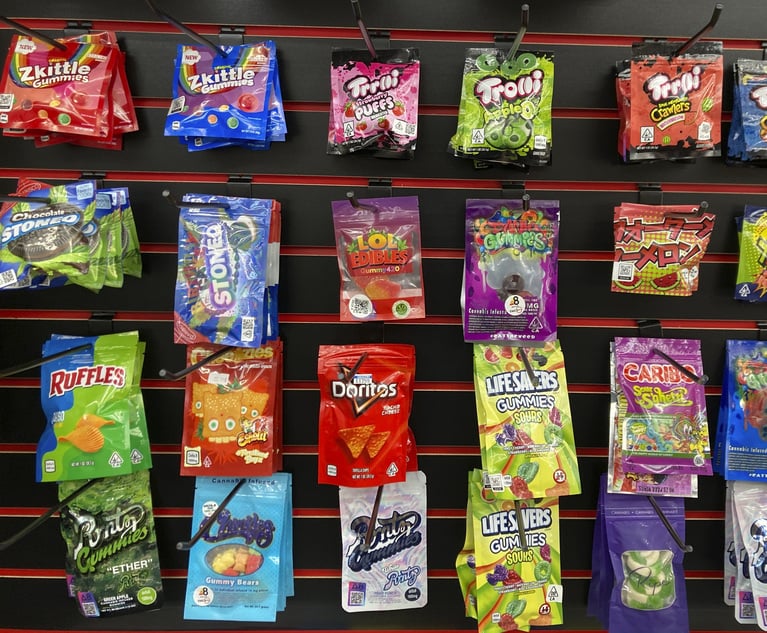Higher Law: Watch This Colorado Patent Case | A Prosecutor's Salty Take on Marijuana | Plus: New Lobbying, and Who Got the Work
Here's why patent lawyers are closely watching a new cannabis case in Colorado federal district court. Plus: one federal prosecutor has a lot to say about pot—on Twitter. Plus: we've got some new lobbying disclosure to share below. Thanks for reading Higher Law.
August 09, 2018 at 04:00 PM
8 minute read
Welcome back to Higher Law, our weekly briefing on all things cannabis. I'm Cheryl Miller, reporting for Law.com from Sacramento. A little more than an hour's drive west from here, Oakland-based Hound Labs recently unveiled its latest invention, a marijuana breathalyzer.
Hound Labs CEO Mike Lynn told NPR the device can accurately detect whether someone has smoked pot in the last two hours. Has an answer to the perplexing questions about marijuana impairment finally been found via this pot breathalyzer? Maybe not.
“We'd like to get to point where there's a little more courtroom acceptance and a little more acceptance in the scientific community,” says Kevin Davis, assistant chief of the California Highway Patrol Enforcement and Planning Division.
What do you think? What legal issues does this on-the-spot, THC-testing device raise? Would you and your client challenge the findings in court? Let me know.
This week, we look at a potentially groundbreaking marijuana patent case in Colorado. Plus, most federal prosecutors have taken a measured approach toward marijuana enforcement. Not Mike Stuart, the U.S. attorney for West Virginia's southern district. And scroll down to see who got the work.
Got a great story idea? Feedback? Thoughts on pot breathalyzers? Drop me a line at [email protected] or call 916-448-2935. Follow me on Twitter at @capitalaccounts.
➤➤ Want to receive this briefing by email? Sign up here.
Colorado Case Has Patent Lawyers Buzzing
This week I wrote in The Recorder about a suit filed by Golden, Colorado-based United Cannabis Corp. alleging that Pure Hemp Collective of Conifer infringed on its patent protecting certain CBD formulations. It was not difficult to find patent lawyers with thoughts on the case. This lawsuit, if it continues, could set precedents in cannabis patent enforcement, a practice area without a whole lot of case law.
A couple of things that I'm still pondering:
>> What's United Cannabis Corp.'s play here? Sure, any patent holder has a right to protect its inventions. But United Cannabis, or UCANN, asserts some very broad claims in its '911 patent, including any “liquid cannabinoid formulation, wherein at least 95 percent of the total cannabinoids is cannabidiol (CBD).” Neil Juneja of Gleam Lawtold IPWatchdog that he's “never seen a weaker cannabis patent in my life.”
“All they did was take one secondary metabolite of cannabis and create the broadest independent claim,” Juneja said.
Is this lawsuit a precursor to other patent enforcement actions against CBD manufacturers?
“UCANN is proud of the CBD-based therapeutics it has developed,” said UCANN's general counsel, Jesús M. Vázquez. “Our company places a high priority on research and development and when it becomes necessary, we will protect our IP rights.”
>> Is Cooley forsaking future work with the $1 billion CBD industry? Cooley partner Orion Armon of the firm's Broomfield, Colorado, office is representing UCANN. He declined to comment on the lawsuit.
CBD businesses are booming as consumers look for the potential health benefits of cannabis-based products that don't contain psychoactive agents. One lawyer told me he expects the CBD industry to rally behind Pure Hemp Collective. Will those same companies have long memories when it comes to Cooley's litigation in this case and their future legal needs? We'll see.
Pure Hemp Collective has not yet filed an answer to UCANN's complaint.
I welcome any thoughts on the case—shoot me a note at [email protected].
Federal Prosecutor Bucks the Line on Marijuana
U.S. attorneys from California to Massachusetts have said that even though marijuana remains illegal at the federal level, their enforcement priorities will focus on cartels, interstate trafficking and sales to minors—not licensed businesses operating in accordance with state law.
Mike Stuart, the U.S. attorney for the southern district of West Virginia, has taken a slightly saltier approach. His Twitter feed regularly notes his displeasure with efforts to legalize cannabis. Stuart joined the prosecution office from the energy-focused law firm Steptoe & Johnson PLLC, where he was co-chair of the corporate services and tax practice group.
“Wash Post: Marijuana addiction is REAL,” Stuart wrote on Aug. 2. “No matter the study, the pro-toke crowd will never accept it. After all, why let facts get in the way of an agenda?”
And on July 22: “I'm sure the lobbying & investing in federally-prohibited marijuana by powerful special interests is not about potential profits but because they care so much about citizens & future of WV. I'm sure that's it. Right?”
In May, the Trump appointee cast doubt on efforts to create protections for banks that want to serve West Virginia's medical marijuana industry, which becomes legal next year. “We enforce all laws,” he told MetroNews.
Maybe no other state is better known for the ravages of opioid addiction than West Virginia. Stuart has made cracking down on illicit drugs a top priority. But marijuana advocates say the prosecutor should not be targeting regulated cannabis.
“We care about thousands of West Virginians who are arrested every year for using #cannabis, which is objectively safer than alcohol/opioids, and we care about replacing criminal gangs with legitimate, tax-paying businesses owned and operated by West Virginians. #regulationworks,” the National Cannabis Industry Association tweeted on July 23.
Who Got the Work
• Sean Dalton has joined the Atlantic City office of Cooper Levenson as of counsel. Dalton was formerly assistant attorney general in the New Jersey AG's office, where he was lead counsel for the criminal justice division's implementation of marijuana legislation. Dalton will work in the cannabis, healthcare, education, and government services practice groups.
• Atlanta-based Surterra Holdings Inc. has filed paperwork to lobby federal officials on a range of issues related to medical marijuana. Surterra, a major operator in Florida's medical marijuana scene, already has lobbying contracts with McGuireWoods and Smith-Free Group. The company's latest filings add Surterra's vice president of external affairs, Andrew Smith, to the lobbying mix.
• California Insurance Commissioner Dave Jones will chair the National Association of Insurance Commissioners' new working group on cannabis insurance. The group will consider regulatory issues such as availability of policies, workers' compensation and consumer protection, according to an NAIC release.
In the Weeds
>> It's not just politicians jumping into the cannabis industry these days. Wrigley heir William “Beau” Wrigley Jr. II has left behind the world of chewing gum for a medical marijuana startup. He led a $65 million investment round for Atlanta-based Surterra Holdings last year and now he's taking on the job of chairman of the medical marijuana company. [Bloomberg]
>> Energy companies spent big money trying to defeat Oklahoma's medical marijuana initiative. ConocoPhillips, Devon Energy Corp. and Phillips 66 were among the oil and gas giants who provided almost half of the $1.3 million to fund an unsuccessful campaign to defeat State Question 788. Companies reported fears that intoxicated employees would jeopardize safety at worksites. [Tulsa World]
>> Don't cap the number of medical marijuana operators in Florida, a judge said. In an eight-page order, Leon Circuit Judge Charles Dodson said statutory caps contradict the medical marijuana-legalizing initiative approved by Florida voters in 2016. Dodson also said the same law unfairly restricted who could get licenses and improperly imposed a vertical integration model on the market. The judge refused to issue an injunction, however. More litigation awaits. [Daily Business Review]
>> Florida A&M University's law school is offering two new marijuana courses.Students will be able to take “Cannabis Law and Cultural Justice” and “Marijuana Law and Policy.” The Orlando-based law school is the first in the state to offer cannabis-related coursework, according the university's newspaper. [The Famuan]
>> Nevada marijuana sales have soared past projected numbers. Sales of $195 million and tax collections in the first year of adult-use legalization have surpassed predictions by 25 percent. And there's no sign California's six-month-old recreational market is hurting Nevada cannabis business. [AP]
>> Recreational marijuana isn't on Pennsylvania's horizon. That's what Gov. Tom Wolf told radio station KDKA. While the state's medical marijuana program is up and running, and the state recently approved the sale of dry leaf, “I don't think the citizens of Pennsylvania are ready for” legal recreational use, Wolf said. Neighbors New Jersey and New York are certainly moving in that direction. [KDKA]
What's Ahead: All the Calendar Things
Aug. 14: California's Bureau of Cannabis Control will take public comment on its proposed final rules for marijuana regulation at the Millennium Biltmore Hotel in Los Angeles.
Aug. 16: Harris Bricken attorneys Daniel Shortt and Alison Malsbury will present a webinar entitled “CBD Legal or Not: How State and Federal Laws Govern the Manufacture, Marketing & Distribution of CBD Products.”
This content has been archived. It is available through our partners, LexisNexis® and Bloomberg Law.
To view this content, please continue to their sites.
Not a Lexis Subscriber?
Subscribe Now
Not a Bloomberg Law Subscriber?
Subscribe Now
NOT FOR REPRINT
© 2025 ALM Global, LLC, All Rights Reserved. Request academic re-use from www.copyright.com. All other uses, submit a request to [email protected]. For more information visit Asset & Logo Licensing.
You Might Like
View All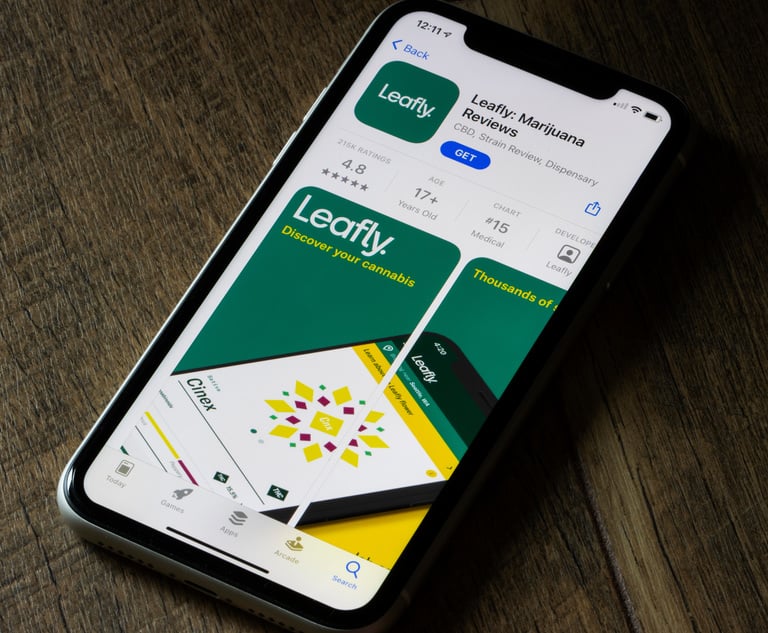
NY Cannabis Marketing Rulings / Rescheduling Effects / Honigman's Work on Trademark Suit / Goodbye
9 minute read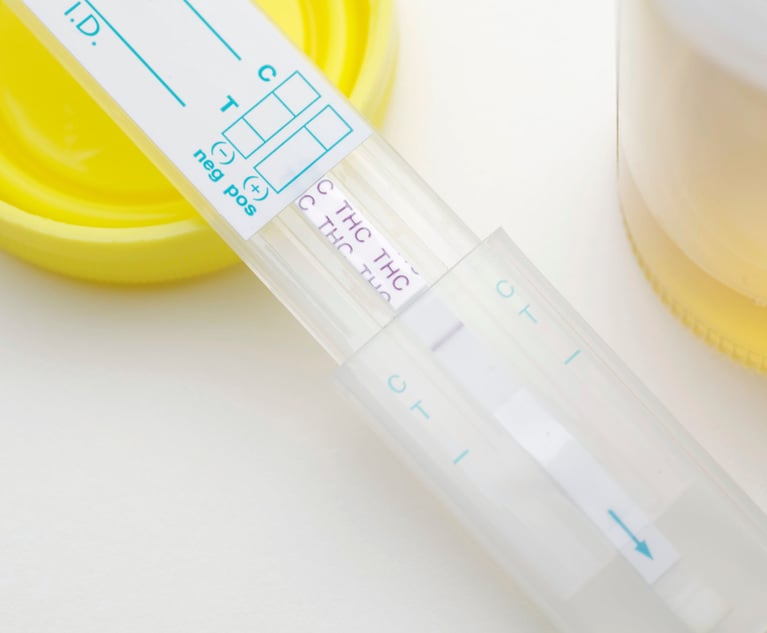
Workplace Weed and Labor Pacts / State AGs and Hemp / Maryland Licensing Suit / Vicente Sues Recruiter
9 minute readTrending Stories
- 1New York-Based Skadden Team Joins White & Case Group in Mexico City for Citigroup Demerger
- 2No Two Wildfires Alike: Lawyers Take Different Legal Strategies in California
- 3Poop-Themed Dog Toy OK as Parody, but Still Tarnished Jack Daniel’s Brand, Court Says
- 4Meet the New President of NY's Association of Trial Court Jurists
- 5Lawyers' Phones Are Ringing: What Should Employers Do If ICE Raids Their Business?
Who Got The Work
J. Brugh Lower of Gibbons has entered an appearance for industrial equipment supplier Devco Corporation in a pending trademark infringement lawsuit. The suit, accusing the defendant of selling knock-off Graco products, was filed Dec. 18 in New Jersey District Court by Rivkin Radler on behalf of Graco Inc. and Graco Minnesota. The case, assigned to U.S. District Judge Zahid N. Quraishi, is 3:24-cv-11294, Graco Inc. et al v. Devco Corporation.
Who Got The Work
Rebecca Maller-Stein and Kent A. Yalowitz of Arnold & Porter Kaye Scholer have entered their appearances for Hanaco Venture Capital and its executives, Lior Prosor and David Frankel, in a pending securities lawsuit. The action, filed on Dec. 24 in New York Southern District Court by Zell, Aron & Co. on behalf of Goldeneye Advisors, accuses the defendants of negligently and fraudulently managing the plaintiff's $1 million investment. The case, assigned to U.S. District Judge Vernon S. Broderick, is 1:24-cv-09918, Goldeneye Advisors, LLC v. Hanaco Venture Capital, Ltd. et al.
Who Got The Work
Attorneys from A&O Shearman has stepped in as defense counsel for Toronto-Dominion Bank and other defendants in a pending securities class action. The suit, filed Dec. 11 in New York Southern District Court by Bleichmar Fonti & Auld, accuses the defendants of concealing the bank's 'pervasive' deficiencies in regards to its compliance with the Bank Secrecy Act and the quality of its anti-money laundering controls. The case, assigned to U.S. District Judge Arun Subramanian, is 1:24-cv-09445, Gonzalez v. The Toronto-Dominion Bank et al.
Who Got The Work
Crown Castle International, a Pennsylvania company providing shared communications infrastructure, has turned to Luke D. Wolf of Gordon Rees Scully Mansukhani to fend off a pending breach-of-contract lawsuit. The court action, filed Nov. 25 in Michigan Eastern District Court by Hooper Hathaway PC on behalf of The Town Residences LLC, accuses Crown Castle of failing to transfer approximately $30,000 in utility payments from T-Mobile in breach of a roof-top lease and assignment agreement. The case, assigned to U.S. District Judge Susan K. Declercq, is 2:24-cv-13131, The Town Residences LLC v. T-Mobile US, Inc. et al.
Who Got The Work
Wilfred P. Coronato and Daniel M. Schwartz of McCarter & English have stepped in as defense counsel to Electrolux Home Products Inc. in a pending product liability lawsuit. The court action, filed Nov. 26 in New York Eastern District Court by Poulos Lopiccolo PC and Nagel Rice LLP on behalf of David Stern, alleges that the defendant's refrigerators’ drawers and shelving repeatedly break and fall apart within months after purchase. The case, assigned to U.S. District Judge Joan M. Azrack, is 2:24-cv-08204, Stern v. Electrolux Home Products, Inc.
Featured Firms
Law Offices of Gary Martin Hays & Associates, P.C.
(470) 294-1674
Law Offices of Mark E. Salomone
(857) 444-6468
Smith & Hassler
(713) 739-1250



